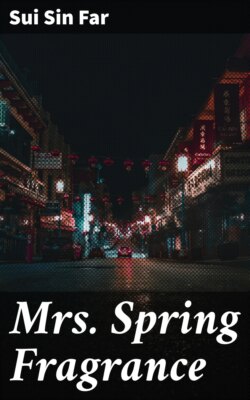Читать книгу Mrs. Spring Fragrance - Sui Sin Far - Страница 10
На сайте Литреса книга снята с продажи.
III
ОглавлениеWill Carman has failed to snare his bird,” said Mr. Spring Fragrance to Mrs. Spring Fragrance.
Their neighbor’s son had just passed their veranda without turning to bestow upon them his usual cheerful greeting.
“It is too bad,” sighed Mrs. Spring Fragrance sympathetically. She clasped her hands together and exclaimed:
“Ah, these Americans! These mysterious, inscrutable, incomprehensible Americans! Had I the divine right of learning I would put them into an immortal book!”
“The divine right of learning,” echoed Mr. Spring Fragrance, “Humph!”
Mrs. Spring Fragrance looked up into her husband’s face in wonderment.
“Is not the authority of the scholar, the student, almost divine?” she queried.
“So ’tis said,” responded he. “So it seems.”
The evening before, Mr. Spring Fragrance, together with several Seattle and San Francisco merchants, had given a dinner to a number of young students who had just arrived from China. The morning papers had devoted several columns to laudation of the students, prophecies as to their future, and the great influence which they would exercise over the destiny of their nation; but no comment whatever was made on the givers of the feast, and Mr. Spring Fragrance was therefore feeling somewhat unappreciated. Were not he and his brother merchants worthy of a little attention? If the students had come to learn things in America, they, the merchants, had accomplished things. There were those amongst them who had been instrumental in bringing several of the students to America. One of the boys was Mr. Spring Fragrance’s own young brother, for whose maintenance and education he had himself sent the wherewithal every year for many years. Mr. Spring Fragrance, though well read in the Chinese classics, was not himself a scholar. As a boy he had come to the shores of America, worked his way up, and by dint of painstaking study after working hours acquired the Western language and Western business ideas. He had made money, saved money, and sent money home. The years had flown, his business had grown. Through his efforts trade between his native town and the port city in which he lived had greatly increased. A school in Canton was being builded in part with funds furnished by him, and a railway syndicate, for the purpose of constructing a line of railway from the big city of Canton to his own native town, was under process of formation, with the name of Spring Fragrance at its head.
No wonder then that Mr. Spring Fragrance muttered “Humph!” when Mrs. Spring Fragrance dilated upon the “divine right of learning,” and that he should feel irritated and humiliated, when, after explaining to her his grievances, she should quote in the words of Confutze: “Be not concerned that men do not know you; be only concerned that you do not know them.” And he had expected wifely sympathy.
He was about to leave the room in a somewhat chilled state of mind when she surprised him again by pattering across to him and following up a low curtsy with these words:
“I bow to you as the grass bends to the wind. Allow me to detain you for just one moment.”
Mr. Spring Fragrance eyed her for a moment with suspicion.
“As I have told you, O Great Man,” continued Mrs. Spring Fragrance, “I desire to write an immortal book, and now that I have learned from you that it is not necessary to acquire the ‘divine right of learning’ in order to accomplish things, I will begin the work without delay. My first subject will be ‘The Inferior Woman of America.’ Please advise me how I shall best inform myself concerning her.”
Mr. Spring Fragrance, perceiving that his wife was now serious, and being easily mollified, sat himself down and rubbed his head. After thinking for a few moments he replied:
“It is the way in America, when a person is to be illustrated, for the illustrator to interview the person’s friends. Perhaps, my dear, you had better confer with the Superior Woman.”
“Surely,” cried Mrs. Spring Fragrance, “no sage was ever so wise as my Great Man.”
“But I lack the ‘divine right of learning,’” dryly deplored Mr. Spring Fragrance.
“I am happy to hear it,” answered Mrs. Spring Fragrance. “If you were a scholar you would have no time to read American poetry and American newspapers.”
Mr. Spring Fragrance laughed heartily.
“You are no Chinese woman,” he teased. “You are an American.”
“Please bring me my parasol and my folding fan,” said Mrs. Spring Fragrance. “I am going out for a walk.”
And Mr. Spring Fragrance obeyed her.
